Best chorus pedals: premium digital and analogue chorus effects for guitar
The chorus is back! Find out why with our pick of the best chorus pedals you need to try today
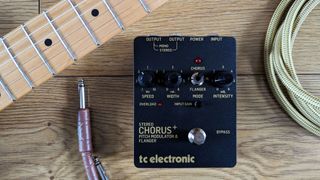
Chorus is well and truly back and fighting for a place on our pedalboards, so it's time to consider what deserves your consideration as the best chorus pedals now. Much maligned for its overuse in the 1980s, chorus nevertheless remained important for some guitar players, with Kurt Cobain and John Frusciante among its '90s devotees. Outside of live use, the guitar effect remained a useful studio tool, defining the bass tones of producers like Andy Wallace.
In the 2000s, inspired in part by the return to popularity of C86 and shoegaze sounds, the chorus pedal came back into the spotlight, with Chase Bliss capturing the mood when they launched their brand on the back of the inspirational Warped Vinyl chorus pedal.
Whether it's for adding movement to ambient parts, or thickening rhythm guitars, chorus has once again become a staple of many guitarists' pedalboards. The likes of John Mayer and The 1975 have also proved those lush '80s modulation sounds can still be very appealing indeed.
We've included some expert buying advice at the end of this guide, so if you'd like to read more about the best chorus pedals, then click the link. If you'd rather get straight to the products, keep scrolling.
- Looking for epic music gear bargains? We're tracking all of this year's biggest savings over on our Black Friday music deals page. If you’re in the market for some fresh guitar gear, check out our Black Friday guitar deals hub.
Best chorus pedals: MusicRadar’s Choice
For a budget chorus, you can't go wrong with the Electro-Harmonix Neo Clone. It sounds good, records well, and nails that Kurt Cobain sound. Granted, there's scant by way of bells and whistles, but if any guitar player could show you that less is more, it's probably Kurt.
At the other end of the scale, and budget, there's the Boss MD-500, which will cover off all your modulation needs, for good. The return of the classic '70s all-analogue TC Electronic SCF Gold is also very welcome with its combination of chorus, flanger and pitch modes.
Should you not need all those options, then you'd be better off with the Boss CE-2W. Solving some of the volume and noise issues of the original, it's probably the best stereo chorus ever made, and the fact it includes an emulation of the rack SDD-320 just makes it sweeter.
Best chorus pedals: Product guide
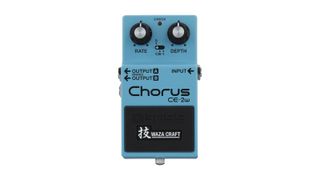
Specifications
Reasons to buy
Reasons to avoid
Ask any wizened effects buff to name the best chorus pedal of all time, and they'll likely cite the first one ever, Boss's iconic 1976 CE-1 Chorus Ensemble unit, or perhaps its later compact-sized incarnation, the CE-2 Chorus. It's a savvy move, then, that Boss has combined these two classic effects for the latest addition to its high-end Waza Craft series, while adding a few new features along the way.
A tiny slider switch holds the key to the CE-2W's versatility. On the left is the standard position for smooth CE-2 sounds, but shift it over to the middle and you get the CE-1's definitive swirl, while the right engages its full-on vibrato mode for proper pitch-bending goodness. The sounds are as authentic as can be, too, thanks to an all-analogue circuit, complete with all-important bucket brigade delay chips.
Read the full Boss CE-2W Chorus review
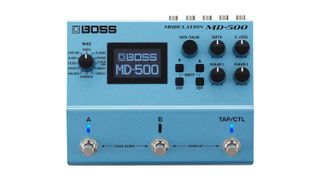
Specifications
Reasons to buy
Reasons to avoid
With 12 different modes, studio-quality audio and endless options for patch customisation, the MD-500 is an endgame modelling chorus.
Within the chorus mode there's a huge variety of options across four chorus modes, not all of which are even strictly chorus. There's a modern chorus, 'prime', a CE-1 emulation, with a secondary vibrato mode, and a tri-chorus, which has 3 detuning LFOs. Among the options are EQ for each mode, and perhaps most excitingly, pre-delay and waveform options for further tweaking.
Besides its chorus bank, it has a dedicated Dimension mode, which seeks to emulate the Roland SDD-320 Dimension D rack chorus. Obviously, being an emulation, it's never going to be perfect, but compared to the SDD-320 mode on the DC-2W reissue, it's not half bad.
Read the full Boss MD-500 review
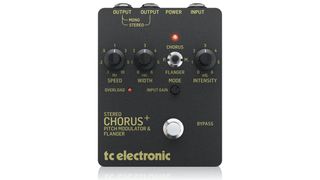
3. TC Electronic SCF Gold
Our expert review:
Specifications
Reasons to buy
Reasons to avoid
When TC's first ever pedal was reissued in 2022 it made a lot of pedal fans very happy indeed. The 1976 original has been updated with a new op-amp in the preamp stage and can now run on a standard 9V power, unlike the originals hardwired transformer.
It's a versatile Bucket Brigade Device pedal that combines its excellent chorus mode with equally impressive flanger and pitch modulation modes that I feel are easily worth the asking price here. Especially if you have a stereo rig.
The chorus sounds here offers a wide range from subtle to fully submerged via the wet/dry balance and after testing it out as part of a pedalboard I think it's a worthy alternative to the CE-2W for those who want to option of flanger sounds with the pitch modulations mod of chorus and pitch vibrato.
Read the full Ibanez Chorus Mini review
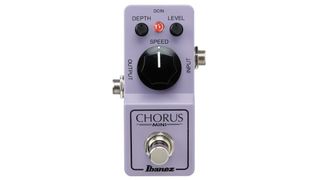
Specifications
Reasons to buy
Reasons to avoid
Where many mini pedals end up going down the pristine Boss CE-2 route, the Chorus Mini takes the denser path of Ibanez's CS9.
It's a sweet, syrupy chorus that's very '80s (think Prince, Metallica), but the level control – a new addition for this mini version – affords extra versatility, with near-vibrato wobbles at higher levels and speeds, while you can nab a decent flanger approximation down the other end of the rate knob.
All in all, that makes it one of the best mini chorus pedals on the market.
Read the full Ibanez Chorus Mini review
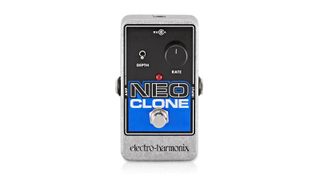
Specifications
Reasons to buy
Reasons to avoid
Thanks to Kurt Cobain, the Small Clone chorus has long been one of EHX's most revered stompboxes. The Neo Clone employs the same basic circuitry as the Small Clone, and EHX states that the electronics have also been "massaged and tweaked to improve accuracy and offer superior sonic qualities".
Some EHX units have a well-earned reputation as being over-the-top sound generators, but it's possible to obtain more subtle tones. That's certainly the case here – if you set the rate to 10 o'clock with a light depth, any clean tone will reap the benefit. The heavier depth setting is more in Andy Summers and vintage Alex Lifeson territory, with plenty of warm vintage shimmer on tap.
It's as close to the original Small Clone as makes no difference and, best of all, should fit snugly onto your existing pedalboard.
Read the full Electro-Harmonix Neo Clone review
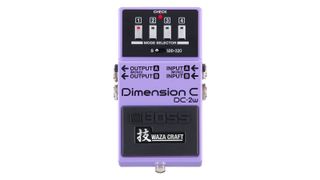
Specifications
Reasons to buy
Reasons to avoid
The original Boss Dimension C was a stereo chorus that had the relatively unique distinction of using two parallel analogue BBD paths to create its sound. That lush, '80s chorus is delivered in spades by the DC-2W, while updates have found issues with the original – noise and low output volume – largely mitigated.
Mode 1 is great for subtle, Siamese Dream-style Smashing Pumpkins tones, while at the other extreme in Mode 4, think She Sells Sanctuary by The Cult. It’s an expensive beast, but this is a unique chorus sound, magnificently executed, and available again at long last.
Read the full Boss DC-2W Dimension C review
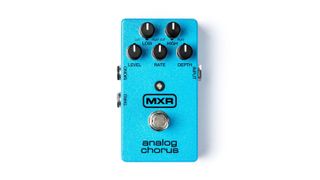
Specifications
Reasons to buy
Reasons to avoid
Somewhere between the minimalist Micro Chorus and the larger format Stereo Chorus, MXR's Analog Chorus combines a pedalboard-friendly compactness with the control provided by five knobs. With true analogue bucket brigade technology onboard, juxtaposition of the rate and depth controls gives a wide range of familiar classy chorus tones.
But it's the other three knobs that sweeten the deal, with the two EQ knobs putting the tone in the zone and the level knob adding in as little or as much effect as you want, from a subtle shift in your tone to a full-on ensemble sound.
Read the full MXR M234 Analog Chorus review
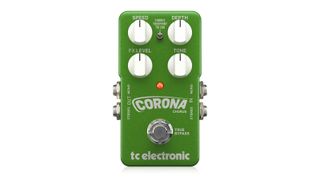
Specifications
Reasons to buy
Reasons to avoid
The Corona delivers a standard chorus effect inspired by the vintage TC Stereo Chorus Flanger plus a Tri Chorus, a variation of the regular chorus that uses three stereo choruses with various offsets for both depth, speed, phase and chorus delay time to produce what TC describes as a unique, very broad and lush chorus.
The key differentiator from its rivals is the company's TonePrint feature: via a phone app or USB connection, you can import a new sound, a custom 'tuning' of the pedal, and store it in a special onboard memory slot called up by the TonePrint position of the pedal's three-way switch. That makes the Corona seriously versatile and almost endlessly updatable.
Read the full TC Electronic Corona Chorus review
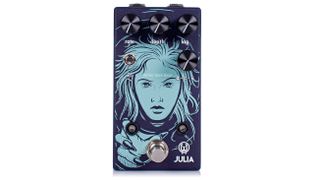
9. Walrus Audio Julia V2
Our expert review:
Specifications
Reasons to buy
Reasons to avoid
Although the front panel of the Julia suggests a complicated pedal, it's relatively simple. The mix knob allows you to travel from chorus to vibrato territory, and the waveform shape control is intuitive as you like; the main complication is the lag control.
The lag controls the centre delay time for the LFO, meaning it can be used to get more unusual sounds. As it's all analogue, the Julia sounds amazing, but it is a tad noisy – that said, it's a small price to pay for great vintage tones.
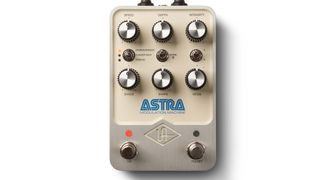
Specifications
Reasons to buy
Reasons to avoid
When Universal Audio decided to enter the effects pedal market with its first UAFX models in 2021, they went all-in with three pedals that showcased the incredible detail of their DSP technology to prove UA are at the forefront of the modelling game. If you want classic chorus sounds as part of a whole modulation package, this is the pedal for you.
In addition to a mode that models the chorus/vibrato sounds of the original CE-1, there's a flanger/doubler modelled after MXR's rackmount unit, a Phase 90, Fender amp tube-driven tremolo and UA's own Dharma Trem 61 (some are available to download onto the pedal after you register it). They all sound fantastic and I found the Astra delivers a rich selection of classic tones for live work in a covers band but also inspiring recording sounds.
The chorus sounds here are derived from the 1976 CE-1 Chorus Ensemble and if you want these sounds alone the Boss CE-2W Chorus is still the better value analogue option, but if you like the idea of investing extremely accurate modelling with the option of other great classic modulation effects from audio history in one unit, this is a sound buy.
Best chorus pedals: Buying advice
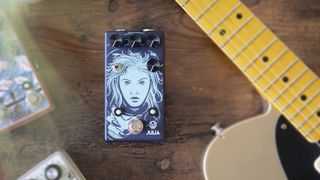
Choosing the best chorus pedal for you
MusicRadar's got your back
Picking the best chorus pedal for you is largely down to finding one where the timbre and options gel with what you're creatively trying to achieve. Chorused sounds often sound 'bigger' or 'fatter' and various spins on it are used in studio situations for altering the timbre of guitars, creating the impression of double-tracking, or sound-staging.
Chorus uses a delay line to split your guitar signal into a ‘dry’ and a duplicate ‘wet’ signal, then an LFO subtly detunes the wet part. This is then blended back with the dry signal. By increasing the mix of the effect toward fully wet, a chorus typically crosses the line into vibrato, with an even more pronounced detuned pitch effect.
There's a complicating wrinkle, however – chorus is in many respects similar to flanging, except with no feedback control and a longer delay line. Flangers tend to top out at about 25ms, which is where chorus takes over. However, this does mean there's some overlap. The rich chorus tones on the Police's 1979 hit Walking On The Moon are in fact not a chorus, but an Electro-Harmonix Electric Mistress Flanger.
As a chorus is, at heart, a delay effect, many of the early choruses were based around analogue bucket-brigade delay chips, which offered a richer, warmer chorus tone. However, just as tape machines allowed the invention of flanging – where an operator simply ran two machines in parallel and put a finger on one to slow it down – they also allowed for chorus effects, albeit unintentionally.
Due to slight oscillations in motor speed or tape transmission – usually due to maintenance, the age of the tape, or the age of the tape machine, the pitch of sounds played back would change slightly, creating chorus. It's largely for this reason – what's called 'wow and flutter', that tape echoes are so coveted.
Nowadays, most choruses are digital, which carries with it the usual tradeoff of increased flexibility at the expense of often more clinical tones. However, this isn't a given; not only are some digital effects rich and warm, but others emulate vintage units for a specific tone, like the Strymon Deco's tape machine modeling.
Find out more about how we test music gear and services at MusicRadar.
Related buyer's guides
- Add extra flavour with the best overdrive pedals for guitar
- Our pick of the best distortion pedals for guitarists
- Best fuzz pedals: put some extra dirt in your tone
- The best delay pedals from Boss, Strymon, EHX and more
- Fatten up your live shows with the best looper pedals
- On a tight budget? Here are the best cheap guitar pedals
- Power up with the best pedalboard power supplies
- The best pedalboards for getting your effects in order
- Check out these gifts for guitarists

“An outstanding selection of delay tones in a budget-friendly and space-saving enclosure”: Nobels’ DEL-mini offers three delays and the width of the stereo spread all from a super-compact $99 pedal

“Notes dance rhythmically, almost creating a reverb diffusion. Those notes are held together with tape-style effects”: Keeley Electronics and Andy Timmons unveil the Halo Core – same modulated dual echo magic, simplified controls
Get the MusicRadar Newsletter
Want all the hottest music and gear news, reviews, deals, features and more, direct to your inbox? Sign up here.
Alex Lynham is a gear obsessive who's been collecting and building modern and vintage equipment since he got his first Saturday job. Besides reviewing countless pedals for Total Guitar, he's written guides on how to build your first pedal, how to build a tube amp from a kit, and briefly went viral when he released a glitch delay pedal, the Atom Smasher.
- James Farmer
- Rob LaingReviews Editor, GuitarWorld.com and MusicRadar guitars

“An outstanding selection of delay tones in a budget-friendly and space-saving enclosure”: Nobels’ DEL-mini offers three delays and the width of the stereo spread all from a super-compact $99 pedal

“Notes dance rhythmically, almost creating a reverb diffusion. Those notes are held together with tape-style effects”: Keeley Electronics and Andy Timmons unveil the Halo Core – same modulated dual echo magic, simplified controls